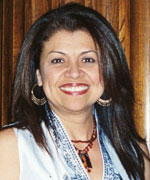June 27, 2005
Professor seeks to reinvigorate national
Chicano studies organization
By Jennifer McNulty
Psychology professor Aida Hurtado tells a family story when
describing her goals as the newly elected leader of the National
Association for Chicana and Chicano Studies (NACCS).
|

Aida Hurtado
|
Every spring, Hurtado says, her 73-year-old mother leaves her
home in McAllen, Texas, and heads to the border city of Reynosa,
Mexico, to get her annual "tune-up."
The ritual includes a new wardrobe, "the works" in
the local beauty salon, and maybe even a new hair color.
"My mother says, 'Renovarse o morir,' which means
reinvent yourself or die," said Hurtado.
That spirit underlies Hurtado's hopes for the nation's largest
ethnic studies organization focused on Latino issues. As the
incoming chair of NACCS, Hurtado wants to increase the association's
visibility and its contributions to public-policy debates. Established
in 1972, the association was formed to support scholars and
students working in Chicano/Latino studies.
"Our group has always had a commitment to activist scholarship--to
putting the knowledge produced in the academy to use in the
community," said Hurtado. "As researchers, we don't
divorce ourselves from social problems."
Over more than three decades, NACCS scholars have built up
an impressive body of research in Chicano and Latino studies
on topics such as immigration, education, poverty, gang violence,
women, and the media, said Hurtado. NACCS members are well-situated
to draft position papers and share their findings with decision
makers and the public, she said.
"We know a lot about the Chicano-Latino population in the
United States, and we have the expertise to really speak on
the issues," said Hurtado. "We need to continue to
mentor the next generation of scholars, because that's our lifeline,
but we also need to draw upon our expertise to move the organization
forward."
Hurtado's own research interests include equity issues in education.
Her most recent books are Chicana/o Identity in Changing
U.S. society ¿Quién soy? ¿Quiénes
somos?, coauthored with Patricia Gurin, and Voicing Chicana
Feminisms: Young Chicanas Speak Out on Sexuality and Feminism,
which received an honorable mention in 2003 from the Gustavus
Myers Center for the Study of Bigotry and Human Rights in North
America.
California, with its large college and university system, leads
the nation in Chicano and Latino studies, and UCSC leads the
state, said Hurtado. "We have an amazing reputation nationally
for Chicano/Latino research," she said. "At UCSC,
we have 20 Chicana/Latinas on the faculty, including eight full
professors--that's the second-largest number of Latinas in the
UC system behind UCLA. I'm very proud to be part of this intellectual
community." Hurtado and her UCSC colleagues Gabriela Arredondo,
Norma Klahn, Olga Nájera-Ramírez, and Patricia
Zavella collaborated on the 2003 book, Chicana Feminisms:
A Critical Reader.
Systemwide, it's a different story. Of 8,444 professors in
the UC system, only 416 are Chicano/Latino, and about one-third
overall are women, according to Hurtado. Nationally, only about
5 percent of 30,000 doctorates awarded in 2003 went to Latinos,
she added.
"We are a very small presence in the academy nationally,
which is why we have to figure out how to open the academic
pipeline and get more graduates at every level," said Hurtado.
"If you asked what the top three policy issues facing Latinos
in this country are, it would be education, education, education."
With more than 40 million Latinos living in the United States,
most of Mexican descent, it is time for NACCS members to share
the expertise they've developed about this growing population,
said Hurtado. "The changing demographics of the country
put us in a very different leadership position nationally,"
said Hurtado, who joined NACCS in 1983.
NACCS has always had an explicitly international focus, and
its scholarly makeup sets it apart from advocacy organizations
like the Mexican American Legal Defense and Educational Fund
and the League of United Latin American Citizens.
"People often think of ethnic organizations as being separatist
or ethnocentric, but we are very much concerned about everybody's
rights and social issues," she explained. "We're in
solidarity with African American struggles. We're not at odds
with each other. A lot of what we have learned about social
justice came from what we learned from the black civil rights
struggle."
Hurtado sees an opportunity for NACCS to influence the terms
of public debate by having association experts draft position
papers for distribution to legislators, think tanks, journalists,
and others.
During her two-year tenure as chair, Hurtado hopes to create
an infrastructure that will make outreach an ongoing activity
of the organization. "I see myself as just the initiator,"
she said.
 Email this story
Email this story
 Printer-friendly version
Printer-friendly version
 Return to Front Page
Return to Front Page